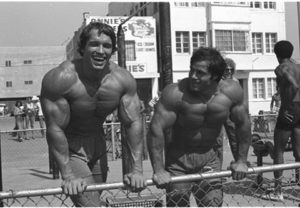
19 Aug Five Tips for High Intensity Training But a Low Stress Life for a Lifter
By: Derek Wilcox
Drama queens, attention whores and generally whiny people should probably stop here and go back to whatever you were doing before instead of reading this article. I’m going to be talking about how to simplify and de-stress your lifting career and hopefully have a smile on your face most of the time, like I do. There are many, many approaches to achieving what I’m going to be talking about but I’m going to tell you the things that work best for me. It may bring some of you a little bit closer to your own truths.
[wa-wps]
1. Don’t spray your training constantly all over social media, forums and any other platform you can post it on.
As I venture through the vastness of the Interwebs every day I see people complaining/bragging about their training, blasting the results of every second of their day on every possible media outlet trying to get as many likes and comments on it as they can. To most of us who come across these types of posts in such volume it seems a desperate cry for attention and just begging for someone to tell you that “You are strong”, “Great job!”, “You’re the best!”. If you need to broadcast what you are doing so much on the Internet to get the amount of attention that you want, you can be just about guaranteed that you don’t deserve anywhere close to the attention that you want yet. It makes no sense to have Michael Bay produce your training video with tons of special effects if you’re doing something exceptionally average in it. Hearing constantly about how SO motivated it is to be doing something will quickly become equivalent to hearing an overplayed song on the radio that was never a hit song in the first place. You don’t want this backlash against you especially if you’re new to the sport. I’ve watched hyper motivated people get buried from this and it causes them to avoid the sport all together afterward. It’s pretty sad to see happen. It has been my experience being around some of the best strength athletes in the world for many years that not only could they normally care less about putting their training out there, it is often more of a burden than anything due to obligations. A lot of the time they want to keep what they do under wraps to try and keep a strategic advantage. The people at that level just want to be the best lifter and competitor that they can and that includes results in competitions, not likes on your page! Priorities folks.
2. Plan out your training and leave it alone.
If you’re constantly tinkering and tweaking your training from week to week or month to month, not only will you have inefficient training methods but you will also lose your mind in the process. Program jumpers go from one trend to the next thinking that it’s the greatest thing since sliced bread and will increase their lifts much better than anything else out there. The constant jumping ends up running them in a big circle where they go nowhere. When the time comes and they become frustrated with lack of progress you can’t even look back at the training to see what worked and what didn’t because they did 5000 things in the last six months which all had different developmental purposes. You need structure in your plans starting with an off-season designed around your weak points and increasing muscle mass where you need it. Transition into a competition phase after that becoming more specific to what you will compete in while keeping fatigue management included throughout both of those times.
Once you have a plan laid out you no longer need to worry about whether you are doing the right thing or not because you are set and only need to reassess after that training cycle. This will be the best thing for you in the long run. You can’t learn anything from chaotic training because the results are chaotic and unpredictable. You should just be going in and putting in the work that you already decided that you needed and leaving. It keeps your training sessions simple and to the point which should put people more at ease.
3. Find good training partners
I’m sure you hear people talk about how important training partners are all the time but there’s a reason people talk about it so much. They truly do make a huge difference in the atmosphere, safety and general enjoyment of training. There’s nothing wrong with training by yourself or having someone that is there sometimes with a decent attitude but you don’t want to have people around you that you can’t depend on or trust. Your safety and success are greatly impacted by those around you. This can be a very high source of stress for the serious lifters out there who really want to succeed. Whether it’s being a spotter, changing plates or especially for the equipped lifters it’s practically a team sport to have one person lift.
The number one way to get the kind of training partners you want in this regard is to be the kind of training partner that you would want for yourself. Treat the people that you lift with the same respect that you want to get back. Even though it seems like something you hear in elementary school it sets the precedent for what is expected in being a training partner with you. It often seems that you should have a ratio of at least 2 to 1 of meets that you went to just to help other people to the needs that you go to compete in where you need help.
When you invest in other’s training the way you would want others to do for yours training you will have a great atmosphere, people who genuinely care about your safety will be spotting you and a much higher rate of success for everyone involved. You might even be lucky enough to be married to a great training partner like I am!
4. If you aren’t spotting or lifting, have fun in between sets!
There are many days that if someone was standing outside of my garage when I trained by myself they would be very confused because they would hear the sound of a weight crashing on the floor or back into a rack and within a few seconds hear a mandolin or some kind of guitar start playing soon after. I still have people recognize me as the guy who was playing the ukulele in the warm-up room of a pro-powerlifting meet several years ago. These things just make me happy and also distract me on days that I don’t feel like training that much. The hilarious BS passed between training partners during training has in my experience only been surpassed by the BS passed between training partners when they’re inebriated together. Cutting up between sets is some of the best fun you can have in your lifting career because believe it or not when you look back after you finish competing and training one day your first thoughts won’t be that you lifted such and such number. You’re always going to be thinking back about the people that you met and spent time with who became good friends or sometimes bitter enemies. These are the real gifts that we get from our sports in the long run so just find ways to have fun while you’re putting in your work and competing and don’t worry about what other people think of you while they’re trying to look intense all the time so people think that they are bad ass and hardcore. I promise you can make progress just as fast if not faster than them all things being equal.
5. Find your intensity trigger
Everyone has heard of athletes “flipping the switch” and “stepping their game up”. A lot of this can have to do with visualization or sitting in line that becomes crossed that tells you that it’s go time or triggers that intensity that is required for great training and competing. When I was young my father told me before my first football game in Little League that when I am off of the football field I’m supposed to be a gentleman but as soon as I crossed the white line to go on to that field I needed to become a genuinely mean person that was violent and focused. That stuck with me forever and now when I start to approach a heavy lift like a squat, when my hands touch the bar it has that same triggering effect. When I release the bar it has the opposite effect and I can go back to being happy and making jokes about whatever calamity just happened or almost happened. This creates a separation between the intensity of training and the fun side of training so that you don’t need to be sitting around brooding looking mean every second that you are in a meet or in the gym. People drive themselves nuts that way and burn themselves out of the sport that they are in. When you take this kind of competitive lifestyle too seriously it will chew you up and spit you back out of it very easily.
Derek Wilcox
Latest posts by Derek Wilcox (see all)
- Derek Wilcox: Strong(ish) Garagebell Chronicles: Powerlifter In A Weightlifting Meet! - May 3, 2018
- Derek Wilcox: Strong(ish) Garagebell Chronicles: Getting Leaner, Stronger And Out Of Breath! - March 27, 2018
- Derek Wilcox: Strong(ish) Garagebell Chronicles: Weightlifting Offseason Activities - March 13, 2018









Sorry, the comment form is closed at this time.